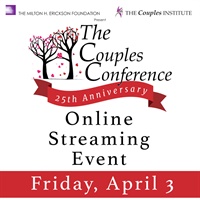
Credit available - Click Here for more information
- Average Rating:
- Not yet rated
- Topic Areas:
- Social Issues | Intimacy | Conflict | Couples Therapy | Keynotes
- Categories:
- Couples Conference | Couples Conference 2021 | Online Continuing Education
- Faculty:
- William Doherty, PhD
- Course Levels:
- Master Degree or Higher in Health-Related Field
- Duration:
- 1 Hour
- Format:
- Audio and Video
- Original Program Date:
- Jun 05, 2021
- Short Description:
- We live in the most polarized era since the 1850s. The presenter will describe the connection between escalating couple conflict and escalating political polarization. He will propose ways that therapists can work with politically divided couples, and he will describe his work since 2016 on “red/blue” polarization in the U.S. via the national nonprofit Braver Angels. He will argue that couples therapists have much to offer a nation in trouble.
- Price:
- $29.00 - Base Price

Credit available - Click Here for more information
- Average Rating:
- Not yet rated
- Topic Areas:
- Couples Therapy | Gender | Masculinity | Topical Panels
- Categories:
- Couples Conference | Couples Conference 2021 | Online Continuing Education
- Faculty:
- Harville Hendrix, PhD | Terry Real, LICSW | Joseph Winn, MSW, LICSW, CST-S
- Course Levels:
- Master Degree or Higher in Health-Related Field
- Duration:
- 59 Minutes
- Format:
- Audio and Video
- Original Program Date:
- Jun 05, 2021
- Short Description:
- Gender roles are in flux and evolve quickly. The panel will review issues of masculinity and indicate how therapists can respond constructively to men.
- Price:
- $29.00 - Base Price

Credit available - Click Here for more information
- Average Rating:
- Not yet rated
- Topic Areas:
- Couples Therapy | Love | Continuing Education | Goals of the Therapist | Keynotes | Relationships
- Categories:
- Couples Conference | Couples Conference 2021 | Online Continuing Education
- Faculty:
- Stan Tatkin, PsyD, MFT
- Course Levels:
- Master Degree or Higher in Health-Related Field
- Duration:
- 1 Hour 2 Minutes
- Format:
- Audio and Video
- Original Program Date:
- Jun 05, 2021
- Short Description:
- As with any approach, couple therapy must have a clear vision toward which the couple can navigate. We may call this the therapeutic goal or therapeutic narrative. The clarity by which the therapist holds this vision and expects the couple to meet this goal largely determines therapeutic success. One such goal is the partner co-creation of a relationship ethos or ethical system based on shared purpose, shared vision, and shared principles of governance. A principle-based relationship, while not based on feelings, may prove vital to the prevention of common relational threat while essential to the fostering of mutually earned love, respect, and admiration.
- Price:
- $29.00 - Base Price

Credit available - Click Here for more information
- Average Rating:
- Not yet rated
- Topic Areas:
- Couples Therapy | Mindfulness | Keynotes | Conflict | Relationships
- Categories:
- Couples Conference | Couples Conference 2021 | Online Continuing Education
- Faculty:
- Ellyn Bader, PhD | Caroline S. Welch
- Course Levels:
- Master Degree or Higher in Health-Related Field
- Duration:
- 58 Minutes
- Format:
- Audio and Video
- Original Program Date:
- Jun 05, 2021
- Short Description:
- Couples therapist Ellyn Bader and Mindsight Institute CEO Caroline Welch will explore how mindfulness can provide an accessible, useful tool in couples therapy, not only for the therapist, the two individuals, and their relationship, but also for the therapeutic process. Mindfulness can be practically applied through Caroline Welch’s 3Ps approach of Purpose, Pivoting, and Pacing to cultivate more resilience which is important to cultivate in couples therapy.
- Price:
- $29.00 - Base Price

Credit available - Click Here for more information
- Average Rating:
- 25
- Topic Areas:
- Couples Therapy | Conflict | Developmental Therapy Model | IMAGO | Infidelity | LGBTQ | Relational Life Therapy Model (RLT) | Relationships | Sex and Sexuality
- Categories:
- Couples Conference | Couples Conference 2020 | Online Continuing Education
- Faculty:
- Ellyn Bader, PhD | Joseph Winn, MSW, LICSW, CST-S | Terry Real, LICSW | Harville Hendrix, PhD | Helen LaKelly Hunt, PhD | Martha Kauppi, MS MFT | Stan Tatkin, PsyD, MFT | William Doherty, PhD | ....
- Course Levels:
- Master Degree or Higher in Health-Related Field
- Duration:
- 4 Hours
- Format:
- Audio and Video
- Original Program Date:
- Apr 03, 2020
- Short Description:
- A streaming option in place of the Couples Conference 2020 4 hour event. This recording provides a comprehensive cross-section of a variety of approaches to couples therapy, including specific therapeutic models, discussions on sexual desire discrepancies, working with resistance in the therapy room and more.
- Price:
- $29.00 - Base Price

- Average Rating:
- Not yet rated
- Topic Areas:
- Workshops | Couples Therapy | Developmental Therapy Model | Experiential Therapy | Conflict | Confrontation
- Bundle:
- CC19 Main Conference Video Bundle
- Categories:
- Couples Conference | Couples Conference 2019
- Faculty:
- Ellyn Bader, PhD
- Course Levels:
- Master Degree or Higher in Health-Related Field
- Duration:
- 1:47:01
- Format:
- Audio and Video
- Original Program Date:
- Apr 14, 2019
- Short Description:
- This advanced workshop is designed to demonstrate core concepts of The Developmental Model of Couples Therapy. Participants will Increase their skills in the Initiator-Inquirer process and in effective confrontation and incisive resolution of intrapsychic conflicts. Join Ellyn Bader and learn how to make developmental assists, strengthen your confrontation skills and promote couples development.
- Price:
-
Sale is $29.00
price reduced from Base Price - $59.00

CC19 Workshop 13 - Working with Escalated Couples: Coming Home from Hell with EFT - Sue Johnson, EdD
Credit available - Click Here for more information
- Average Rating:
- Not yet rated
- Topic Areas:
- Workshops | Attachment | Couples Therapy | Emotionally Focused Therapy (EFT)
- Bundle:
- CC19 Main Conference Video Bundle | CC19 Individual Selections
- Categories:
- Couples Conference | Couples Conference 2019 | Online Continuing Education
- Faculty:
- Sue Johnson, EdD
- Course Levels:
- Master Degree or Higher in Health-Related Field
- Duration:
- 2:22:13
- Format:
- Audio and Video
- Original Program Date:
- Apr 14, 2019
- Short Description:
- This workshop will outline the EFT Way through conflict and disconnection, pain and mayhem that is a couple at war with each other. Specific interventions such as Catch the Bullet will be outlined. In the second half of the workshop, the process of attachment injury healing will also be addressed.
- Price:
-
Sale is $29.00
price reduced from Base Price - $59.00

Credit available - Click Here for more information
- Average Rating:
- Not yet rated
- Topic Areas:
- Workshops | Psychobiological Approach to Couples Therapy (PACT) | Personality Disorders | Continuing Education | Couples Therapy | Attachment
- Bundle:
- CC19 Main Conference Audio Bundle | CC19 Individual Selections
- Categories:
- Couples Conference | Couples Conference 2019 | Online Continuing Education
- Faculty:
- Stan Tatkin, PsyD, MFT
- Duration:
- 3:06:45
- Format:
- Audio Only
- Original Program Date:
- Apr 14, 2019
- Short Description:
- This workshop will take the first two introductory seminars and push it working with personality disordered partners. We will move from an attachment model to that of an American object relations/ego psychology to understand the structural and functional differences between insecure attachment and personality disordered individuals and how to work with them in couple therapy.
- Price:
- $15.00 - Base Price

Credit available - Click Here for more information
- Average Rating:
- Not yet rated
- Topic Areas:
- Keynotes | Neuroscience | Attachment | Couples Therapy | Relationships
- Bundle:
- CC19 Main Conference Video Bundle | CC19 Individual Selections
- Categories:
- Couples Conference | Couples Conference 2019 | Online Continuing Education
- Faculty:
- Stan Tatkin, PsyD, MFT
- Course Levels:
- Master Degree or Higher in Health-Related Field
- Duration:
- 59:40
- Format:
- Audio and Video
- Original Program Date:
- Apr 14, 2019
- Short Description:
- We currently live in a time of great emotional stress around matters of fairness, justice, ethics, and morality. As couple therapists, we are working with the smallest unit of a society, the two-person system that is the primary attachment partnership. Therapists should have a strong understanding of their own moral and ethical compass when guiding partner behavior that occurs inside and outside of therapy.
- Price:
-
Sale is $29.00
price reduced from Base Price - $59.00

Credit available - Click Here for more information
- Average Rating:
- Not yet rated
- Topic Areas:
- Workshops | Couples Therapy | Relational Life Therapy Model (RLT) | Relationships
- Bundle:
- CC19 Main Conference Audio Bundle | CC19 Individual Selections
- Categories:
- Couples Conference | Couples Conference 2019 | Online Continuing Education
- Faculty:
- Terry Real, LICSW
- Duration:
- 1:10:29
- Format:
- Audio Only
- Original Program Date:
- Apr 14, 2019
- Short Description:
- This workshop moves beyond the first phase of RLT to detail the theory and technique of phase two: Family Of Origin Work, trauma and Inner Child Work. In phase one we identified each partner’s relational stance and how the two stances combine to produce the couple’s choreography – the vicious circle they come to us trapped within. Now we travel through the stance back to where it first came from – the particular childhood experiences each partner’s Adaptive Child part was adapting to.
- Price:
- $15.00 - Base Price
Please wait ...

